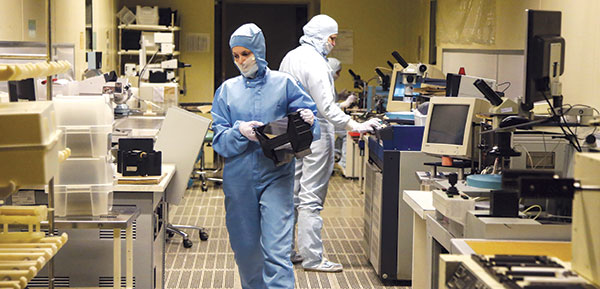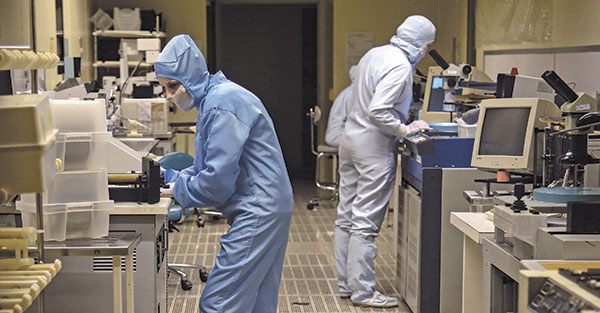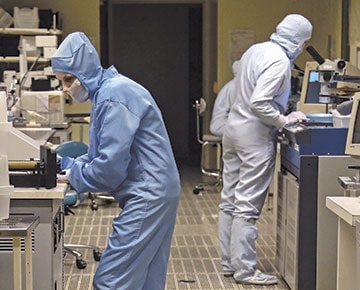Today Belarus liaises with 149 countries in innovative sphere
The Belarusian economy is among the most open in the world, exporting around 60 percent of its produce: almost double the global average. The Chairman of the Belarusian State Committee for Science and Technology, Alexander Shumilin, explains, “Our Government is pursuing a consistent policy to build economic knowledge and enhance citizens’ wellbeing through innovative development. With this in mind, all state programmes aim not only to increase exports but to enhance sales of science-intensive and high-tech produce.”

Those working at Minsk’s Integral Plant are true innovative experts
In 2014, around $8.3 billion of such products were exported worldwide and Mr. Shumilin notes that there has been a significant shift towards software and consulting, with 70 percent of service sales relying on IT. It’s a pleasing trend. Belarus is focusing not only on countries with high sci-tech potential but on developing nations across Asia, Africa and Latin America. It is extending its export diversity, to cover more science-intensive and sci-tech products, helping guard against global market fluctuations.
“In February 2015, we took part in Tehran’s conference on science, technologies and innovations (as part of the Non-Aligned Movement),” continues Mr. Shumilin. “The event gathered 58 countries and nine international scientific organisations, including the Arab League, and the Abdus Salam International Centre for Theoretical Physics. Belarus’ presentation, in Russian, of its sci-tech potential aroused much interest. Most heads of scientific agencies in Africa, Asia and Latin America graduated from Moscow and Minsk Russian-language higher educational establishments so they sometimes know Russian better than English.” He comments that this uniting factor opens prospects for new sales markets. While these countries may be little interested in the USA, our developments in the field of agriculture and machinery modernisation, known since Soviet times, arouse true interest.
Belarusians can also learn from their Russian colleagues — particularly in the sphere of entrepreneurship. Mr. Shumilin underlines, “Russia was the first to use non-budget financing successfully for scientific developments and projects. We’re now actively co-operating with Russian venture companies, studying their experience. This year, we plan to establish a Belarusian-Russian venture company.”

Microcircuit production at Minsk’s Integral Plant
Russia is our long-standing, stable strategic partner in many areas — including science. In 2014, ten sci-tech projects were fulfilled as part of Union State programmes — worth 3.151 billion Russian Roubles (around $100m). This year, scientists from both states plan to realise programmes on the exploration and mining of natural resources: SKIF-Nedra and Skif-Geo. These studies are important, since drilling of a single mine costs from $500,000 to $2m at present; if in vain, much money is wasted. Prognosis of natural deposits (via probing) is vital for Russia, being rich in natural resources. The Union State budget is allocating around $12.6m this year, for this goal alone.
As a result of the Union State’s Cosmos-BR and Cosmos-SG programmes, 19 new cosmic devices have been developed. Among them is Belarus’ energy-efficient small-scale impulse plasma engine: the best of its kind for small satellites. In addition, we have developed an on-board complex desk to manage a new generation meteo-satellite, boasting increased durability, reduced weight and production-efficiency.
The Union State has another promising avenue of joint work: the Development and Production of New Generation Micro System Equipment and Unified Integrated Systems for Double Purposes sci-tech programme. Belarusian specialists are now developing 14 samples of technical control-measuring and methodological equipment. To efficiently implement the programme, joint centres are being established: at Mikrosistematechnika (in St. Petersburg) and at Belarus’ Planar. According to preliminary estimations, the programme is worth around $9m in import substitution for the Union State. More than $50m has been allocated this year to finance Union State sci-tech programmes.
Alexander Shumilin, Chairman of the Belarusian State Committee for Science and Technology:
This year, scientists from both states plan to realise programmes on the exploration and mining of natural resources: SKIF-Nedra and Skif-Geo. These studies are important, since drilling of a single mine costs from $500,000 to $2m at present; if in vain, much money is wasted. Prognosis of natural deposits (via probing) is vital for Russia, being rich in natural resources. The Union State budget is allocating around $12.6m this year, for this goal alone.
By Olga Bebenina











